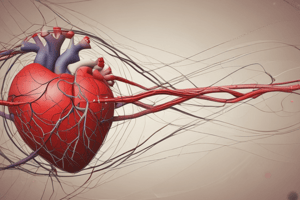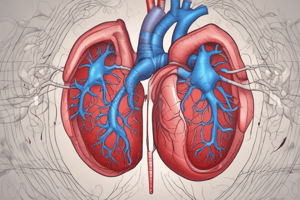Podcast
Questions and Answers
What is the common name for high blood pressure that exceeds 140 systolic and 90 diastolic?
What is the common name for high blood pressure that exceeds 140 systolic and 90 diastolic?
- Hypertension (correct)
- Bradycardia
- Tachycardia
- Hypotension
What is the primary cause of essential hypertension?
What is the primary cause of essential hypertension?
- Overproduction of hormones
- Multifactorial: genetic predisposition and environmental factors (correct)
- Atherosclerosis
- Kidney disease
What is the main risk factor for developing hypertension?
What is the main risk factor for developing hypertension?
- Age
- Obesity
- Sedentary lifestyle
- All of the above (correct)
What is the goal of treatment for hypertension?
What is the goal of treatment for hypertension?
What is the recommended course of treatment for hypertension?
What is the recommended course of treatment for hypertension?
What is the effect of diuretics on stroke volume?
What is the effect of diuretics on stroke volume?
What is the mechanism of action of arteriolar vasodilators?
What is the mechanism of action of arteriolar vasodilators?
What is the long-term effect of diuretics on stroke volume?
What is the long-term effect of diuretics on stroke volume?
What is the mechanism of action of thiazide diuretics?
What is the mechanism of action of thiazide diuretics?
What is a common side effect of thiazide diuretics?
What is a common side effect of thiazide diuretics?
Flashcards are hidden until you start studying
Study Notes
Blood Pressure Regulation
- Blood pressure is regulated by the interaction of stroke volume (SV) and peripheral resistance (PR)
- Sympathetic nervous system (SNS) and renin-angiotensin-aldosterone system (RAAS) play a crucial role in blood pressure regulation
Normal Blood Pressure and Hypertension
- Normal blood pressure is 120/80 mmHg
- Hypertension is defined as a systemic arterial pressure exceeding 140/90 mmHg
- General narrowing of arterioles is the direct cause of hypertension
- Main risk factors for hypertension include obesity, excessive salt consumption, stressful conditions, sedentary lifestyle, and age
Primary and Secondary Hypertension
- Primary hypertension (~90% of cases) is multifactorial, with genetic predisposition and environmental factors contributing to its development
- Secondary hypertension (~10% of cases) can be caused by other organ changes, such as kidney disease, hormone overproduction, or atherosclerosis
Consequences of Hypertension
- Organ damage, constriction of heart, retina, and kidney vessels
- Heart attack, heart and kidney failure, and visual disturbances
Treatment of Hypertension
- Treatment of co-morbidities and prevention of target organ damage
- Administration of low-dose, long-acting preparations is recommended
- Combined treatment is most often used, with options including fixed combination pills or individualized therapy
Pharmacological Treatment Options
- Reducing stroke volume:
- Diuretics (reduce circulating blood volume)
- Beta-blocking sympatholytics (reduce heart rate and heart muscle function)
- Expanding the vascular system:
- Sympatholytics (central nervous system effect or alpha-sympatholytics)
- Drugs that inhibit the RAAS system (beta-blockers, direct renin inhibitors, ACE inhibitors, angiotensin II receptor blockers)
- Arteriolar vasodilators:
- Directly acting on vessel walls, promoting NO formation and vasodilation
- Ca-channel inhibitors (blockers):
- Reducing intracellular calcium in smooth muscle cells, reducing contraction
Diuretics
- Reduce extracellular volume, leading to decreased blood volume and preload, and ultimately decreased SV
- After 6-8 weeks, SV recovers, but PR decreases, maintaining the effect
- Types of diuretics:
- Thiazides (e.g., hydrochlorothiazide, indapamide)
- Loop diuretics (e.g., furosemide)
- Potassium-sparing diuretics (e.g., eplerenone, aldosterone antagonists)
Studying That Suits You
Use AI to generate personalized quizzes and flashcards to suit your learning preferences.






